Happy Thanksgiving everyone! We thought we’d send along some holiday greetings and share the latest show while you slide into your turkey-based coma…
Reviews galore this time around with Nightfall: Blood Country from AEG, Panic Station from Stronghold Games, U-Boat Leader from DVG, The Legend of Drizzt from Wizards of the Coast, and Nitro Dice from Minion Games.
Download the show to take it on the go right here.
And don’t forget, The Gaming Gang is available on iTunes.
Also add the podcast feed to your favorite aggregator or app with this link.
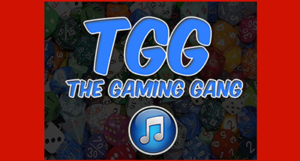
Latest posts by Jeff McAleer (see all)
- Pre-order the Warhammer 40,000 Roleplay: Imperium Maledictum – Macharian Requisition Guide - Mar 14, 2025
- Gary Gygax’s Castle Zagyg Volumes #1-3 is Up for Crowdfunding for Troll Lord Games - Mar 14, 2025
- Blacklight Modern Horror Shadowdark Fueled RPG Passes 300% Funding on Kickstarter - Mar 14, 2025
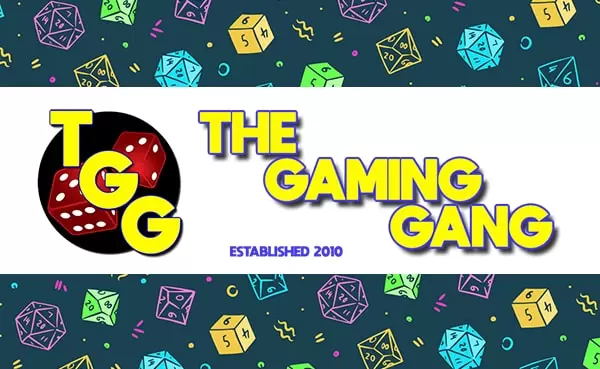




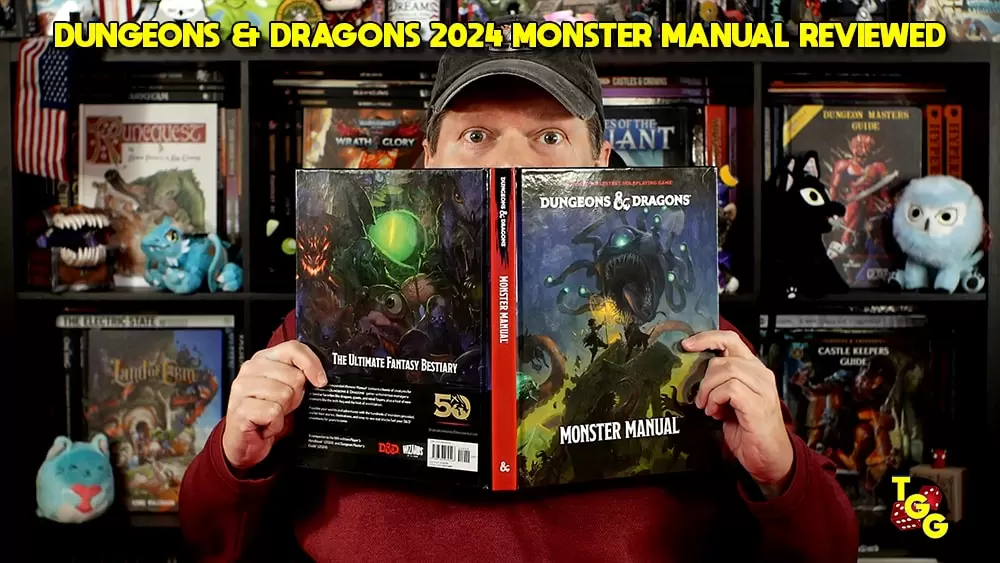
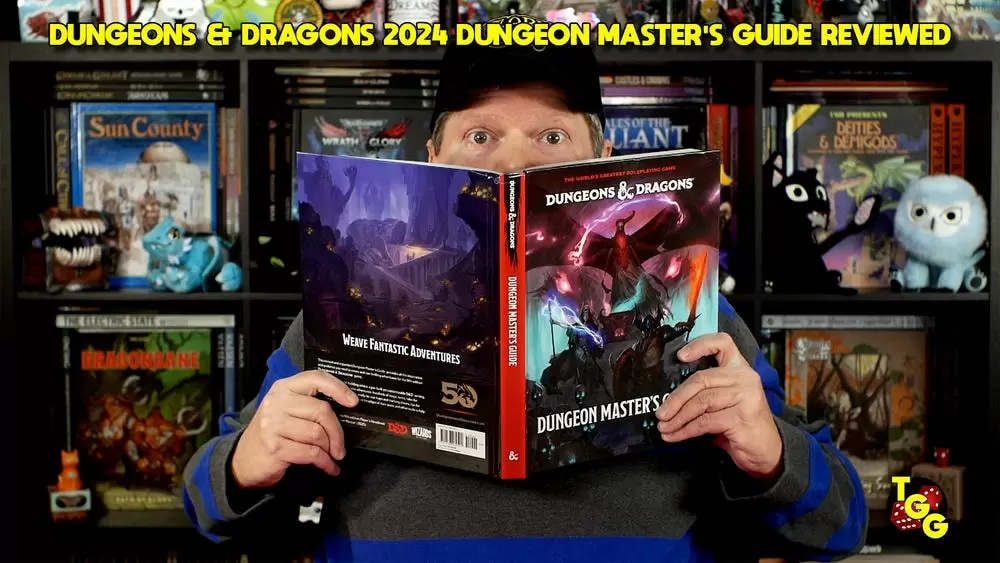

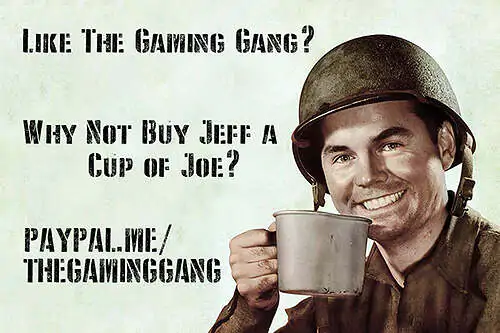
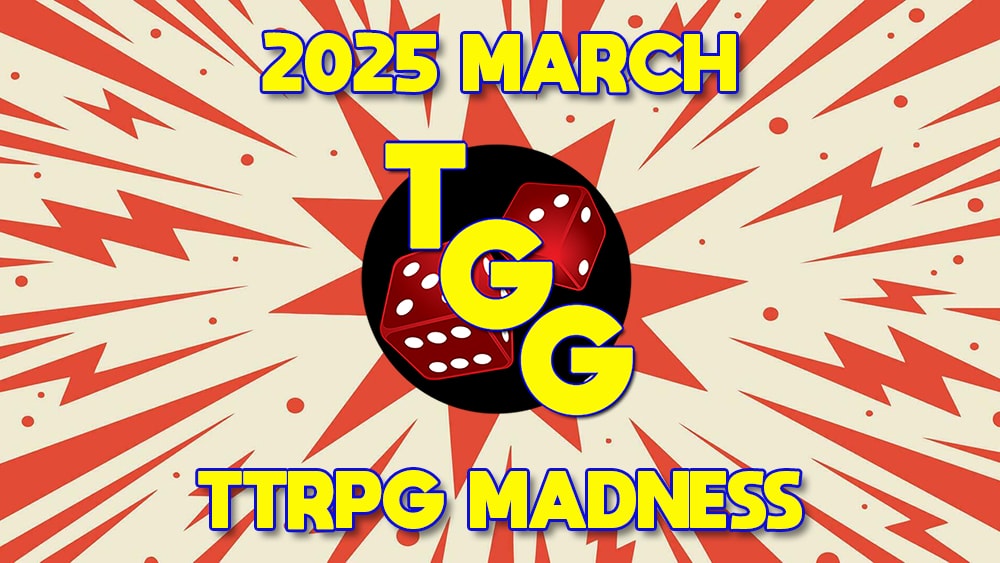


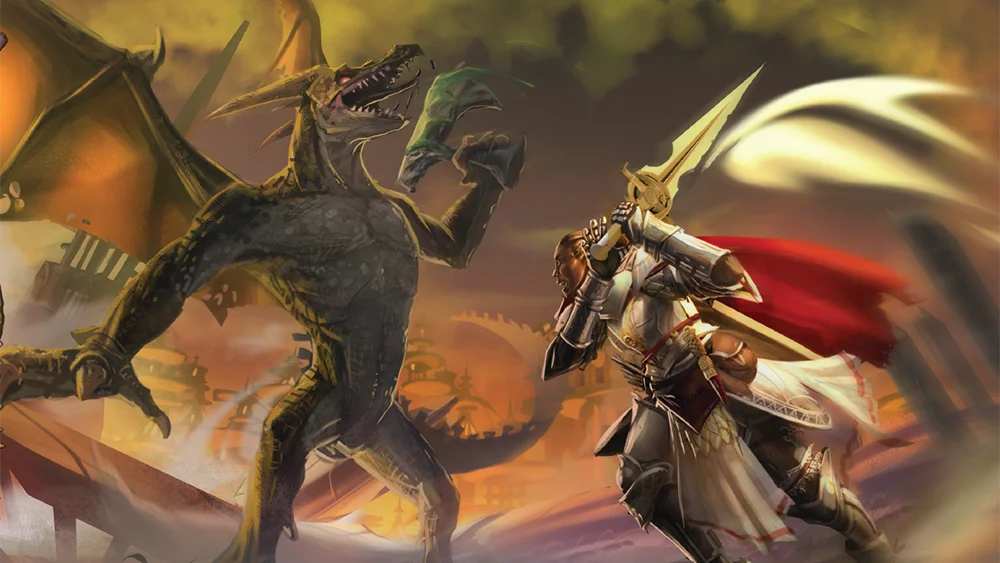

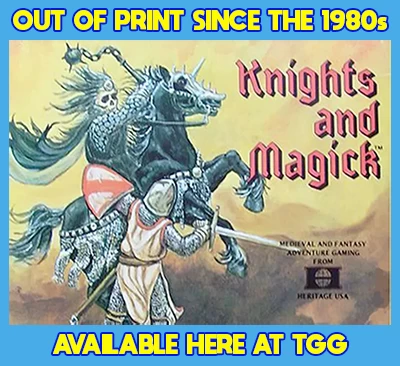



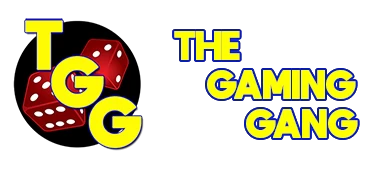
Jeff,
I am not a business person, and I do not know what you do for a living, but I have to say that your pneumonia-induced rant about how dumb every single person on Kickstarter is really rubbed me the wrong way.
I also disagree with your sentiment that companies “with money” should not be on Kickstarter at all. Business is about making money. Kickstarter is a way for companies to minimize risk and make more money, so they can make more games. That sounds great to me. Sometimes some of the best products come from the biggest risks – using Kickstarter, companies and take bigger creative risks while protecting their own security as a viable business. A chance at better, more exciting games without having to see game companies go under? I am all for that.
And you said SEVERAL times that Kickstarter is terrible for the hobby. You said, “Kickstarter is terrible for the hobby,” many times, however not once did you say, “Kickstarter is bad for the hobby because…” I would like to hear why you think Kickstarter is bad for the hobby. The market will support what it can support. As more people find their way to this wonderful hobby, more games will be published to meet demand. Of course, games will fail every year – it is rare for a market’s demand to outweigh its supply, it is almost always the other way around. Why is it that you seem to believe that the more games that are published, the worse off we all are? Choice is good. More choices is not always better, but I believe that in this case – where this market is expanding fairly rapidly – variety, quantity, and, inevitably, quality are all good things to help bring in even more people.
I specifically address this comment in our latest show, which will be online 12/9.
Hello Gang!
Found you on Itunes, I think, listening to your extras while at gencon. Great idea and really enjoyed. Have listed to several regular gaming gang podcasts now. Subscribe now. Nice work, thanks.
Was looking forward to review of u-boat leader when I saw you were doing that. You got to reviews and announced you were cutting your reviews short – and then you did.
Don’t know whose telling you to do that, but they are getting you away from your heart.
The in-depth review, for me, are the heart of your show. It’s where the combination of your experience of gaming, and playing new games, and knowing a bit about what works in a design all come together. This is what it’s about.
You don’t have to fit your show to anyone’s schedule. It’s not nbc, no one uses cds anymore. Every player has a fast forward; put a little music to denote summary moment so people know when to stop. Something or another, if you feel you really have to do what a few say.
You’ve built a subscription base doing what you do.
If a few people complain about length, you can assume everyone else who listens likes what you were doing. One of those popular podcasts, I just them too, D6?, they do like 3.5 hour podcast and they just had their 1,000,000 download.
Also – this isn’t your money job. Do what you want. Clearly people like it. I do.
In the business of totally free enterprise, cause your doing this for free I think, who is it you have to please? YOU!!!
I hate to see you give in to this.
Let’s have the meaty reviews please. You do such a great job at it and it’s what sets you apart. That, and the fact you’re willing to go into why a game doesn’t work, and actually give a game a less than good review.
Let’s hear what you really thought about uboat leader, and note that, gmt games, I think, is also doing a uboat game (p500?). Love to see what you think of all that.
I was going to go back and edit what I just wrote, but as an example to you, I’m leaving it long.
Cheers,
Keith
Keith,
Have no fear! We aren’t going to suddenly be like some other podcasts out there and devote a miniscule three to four minutes reviewing a game; we’re still going to go in depth. Elliott and I are just looking to keep the pace of the show clipping along and, in the past, we have had reviews that ran 30-40 minutes and I think that’s just way too long to go on about a particular game. If I start zoning out while listening to our own show that’s means there’s an issue.
I think 15-20 minutes is a realistic amount of time for a review to keep it interesting while allowing enough time to be able to give a good feel for the meat of the title.
Obviously, we like to get feedback from our visitors and listeners but rest assured, we do march to the beat of our own drummer and aren’t about to make major changes based on the criticism’s of one or two emails. 🙂
Jeff,
I appreciate your response.
I also sincerely apologize for the very confrontational and offensive tone I took in my comment. It was unintentional.
Either way, I apologize. I enjoy debate and discussion, and only wanted some clarification on your views. I can see now (through both rereading what I wrote and being forced to listen to my own rant) that I could have done so with more tact.
I am a fan of you and the show, and I really enjoy your reviews. I don’t always agree with you, but I always feel like I have a good idea of whether any game you’ve reviewed would be a good fit for me or not. I purchased Hero of Weekhawken after listening to you talk about it on an episode. I probably would never had heard of it otherwise.
I would also like to specifically apologize for claiming you called everyone with a project on Kickstarter dumb. It was hyperbole, and it was misplaced.
What you actually said was, “If my game won multiple awards, if my game concept won multiple awards and I’ve been trying to get this in print since 2006, I would go and look at other avenues. Because you know what? You might be a great game designer, but you’re probably a horrible business person. Because if your game is that good, it shouldn’t have taken more than 5 years to possibly get it published…Don’t get involved with fly-by-night companies! That’s what it boils down to. Or don’t be stupid [emphasis added] enough to sell the rights to your game, to your baby, to your creation, to somebody who you don’t believe is going to bring it to fruition…If you just walk around, with your head in the clouds, then you’re going to be screwed either way…I’m just saying, if my game was so awesome, it wouldn’t have taken me 5 years to get it published.”
So, although you did not call everyone on Kickstarter dumb, I think you’ll agree that you were less than kind about people who put games on Kickstarter rather than bring it to publishers or attempt to self-publish. You imply that some of the people with games on Kickstarter are people who are terrible business people, make stupid decisions with their creations, or have their head in the clouds.
You claimed in your response to me that “quantity is not a good thing.” I would agree, to a point. Choice, for the consumer, is generally good. It encourages competition and helps keep companies and the market “honest.” Too much product in the market can be a bad thing. With too many choices, some products are inevitably not going to sell enough for the parent companies to stay afloat.
The comic book industry (which collapsed for a variety of reasons, and continues to have comparatively poor sales today for a variety of reasons) and the video game industry (which is no longer booming like it was in past years, but is still prospering) are both examples of industries that have a lot of product on the market, and therefore have failures to deal with as well. However, I do not see very many similarities to these two industries and Kickstarter.
Comic books do suffer from an oversaturation problem. Very recently, DC started an attempt to address this issue by rebooting all of its major franchises, abandoning all current storylines and spinoffs, and condensing them down into its main tentpole franchises. However comic books continue to have low sales for several reasons other than oversaturation. The rise of other entertainment mediums, such as movies and video games (most of which do not rely on an episodic story structure stretched over a long period of time) have taken consumer dollars away from comic books. The collapse we are talking about happened a little over a decade ago. It is reasonable that the industry is still recovering. One of the factors that fueled the crash, price speculation, was also a factor that fueled sales. With the market crash being so recent, this has been discouraged and slowed.
The video game industry is still in good shape and does a lot of business. I believe that the closure of so many publishing and development companies in the industry is due less to oversaturation, and more to a seismic shift in the video game industry at large. Until a few years ago, almost all of the industry’s focus was on console gaming. However, with the rapid rise of social gaming and mobile gaming, many publishers and developers are being caught flat footed and are unable to react to the changing market. This is not unlike what we saw when the focus shifted from PC games to console games – lots of publishers and developers bit the dust then as well.
I feel the two examples you gave of oversaturation were not tremendously apt. Besides which, you were not complaining about the industry at large being oversaturated, you were complaining about Kickstarter, which is only a subset of the board game hobby.
Now, going with the estimates I heard on your show, which I believe were 750 games at Essen and 250 games on Kickstarter. Forgetting the fact that it is likely that all those games may not all be released to the same markets within the same year, and figuring about 800-1000 games are released outside both of those channels this year, that makes 1800-2000 games released in 2011. Now I know this isn’t going to be very accurate, as those numbers are estimations and best guesses, BUT if we say 1800 games came out in 2011, and 250 of those are from Kickstarter, that means that the games on Kickstarter make up about 14% of the total games released in 2011. Are we prepared to blame an oversaturation of the market on 14%? IF board gaming suffers from an oversaturation problem, it is not Kickstarter’s fault.
You also argue that with 1000 games a year, and an average gamer buying about 12-20 games a year, very few gamers will be purchasing a copy of all 1000 of the new games that come out each year. The problem I have with this argument is that you and I both know that it is nowhere near necessary for any one individual to buy every copy of a new thing that comes out a year to support an industry. Is there anyone alive who saw every movie released to theaters in 2011? Is there someone in the world that buys every song that gets released in a year? Doubtful! In fact, that industry has piracy to deal with!! I know it is not doing well, but the music industry has yet to collapse under the weight of no one buying EVERYTHING that gets produced in a year.
The NPD estimated that in 2008, almost 800 million dollars worth of board games were sold in the US alone. That means that (figuring with an average cost of about $40 a game) 20 million units were sold. If 1000 games were released in 2008 (a year before Kickstarter was even founded), that means each of those games would have sold an average of 20,000 units each. (Without the 250 Kickstarter games, they would have sold almost 27,000 units each.)
Your second point about Kickstarter, that there is no way for a funder to ACTUALLY KNOW what he or she is getting, is certainly valid. However, I would argue that while this is a good reason for anyone to not use Kickstarter, I do not think it is a valid point to support the argument for why Kickstarter is bad for the hobby. Clearly, Kickstarter is not for everyone. The people who fund projects on Kickstarter are absolutely taking a calculated risk. But this is not something that is a detriment to the hobby.
If you don’t like Kickstarter, that is one thing. But you said in the previous podcast that you thought Kickstarter was terrible for the hobby, and I wanted to understand why.
Again, I appreciate your response, apologize for my initial comment, and hope that this one comes across as much more civil and even headed.
Actually, this is in regards to my follow up on Episode 30, but I’ll run with it here.
As far as Kickstarter, I really have no hard or fast like or dislike for it whatsoever. For it’s intended purpose, I think it’s a great way to gain exposure and possibly garner funding to launch whatever project you’ve submitted. I just look at it as something that is currently a golden goose for some and not looking forward to whatever may possibly kill that goose sometime in the future. Having the opportunity to talk with many people behind the scenes in the industry, many of them are up in the air as far as Kickstarter as well. If you check out the soon to be posted interview with Byron Collins of Collins Epic Wargames, Byron goes into some details behind his own Kickstarter project and, although he is a proponent of the site, does agree that there are loads of issues to look into for first time publishers.
The numbers you present are interesting but I believe skewed. Most games have first print runs in the vicinity of 1,500 to 5,000. This normally depends on the company and the title itself. Obviously, subsequent print runs (if there are ever any) will be a little bit larger or will match a bigger initial run because they become much more profitable. I’d say if just about any of the publishers we talk about sold 20k copies of each title on average, let alone one title, in a year they’d fall down on their knees and praise the heavens… I think when we talk about board games here on the site we really aren’t including many kids games or those that have been reprinted umpteen times for children, or party games such as Pictionary, or say Trivial Pursuit sort of games. We really don’t tackle these mass market sorts of games as we consider our audience to be hobby gamers or, in other words, just about every American played something like Chutes and Ladders or Hi Ho Cherry-O as a child but that doesn’t mean years later they’re playing Agricola. Whereas Battleship or Monopoly sell well over 20,000 units in a year, Mansions of Madness does not. Just using MoM as an example but that’s what I mean by skewed numbers; all of the mass market games out there will obviously pump up the numbers for game sales overall.
In the end, I just voice my opinion – an overall impression I may have in some cases – and everyone is certainly entitled to hold their own beliefs of what will and will not work in the hobby. We certainly never claim to be the masters of all things gaming by a long shot. I addressed your initial comment on the show because you were correct that I probably didn’t state my reasoning clearly for having many reservations about Kickstarter. Honestly, it isn’t Kickstarter per say, but more along the lines of how it’s being utilized by some people and how you really have no concrete idea if the end product will match up with what is being promoted. Elliott and I have heard stories of projects being funded and people not receiving anything (well past the promised ship date) as well as other who backed a project only to find that the title is now being sold at cons or stores while those who pledged and were charged hard earned money for the game have yet to receive their copies.
Obviously, we’re big supporters of small and first time publishers; there are many games and publishers you read or hear about here at TGG that don’t get a whole lot of exposure elsewhere and we’re proud of the fact that we treat the latest release from Mr. Man or Ms. Woman, first time game publisher, in the same way as something from AEG, or FFG, or anyone else. I think I was a bit hard on the designer of the Island game because I know of a company, right off the top of my head, where he could have brought the design. They would have developed it and published it for him while allowing him to maintain the rights to the title – if it’s as outstanding as was presented. Sure, he may not have made as much money on its release but it would have been brought in front of the public and, once people were enjoying the game and word got out, he could have taken that very same design elsewhere and negotiated a new run. We understand it can be extremely tough to get a game out there on the market but there are ways to do it (Kickstarter being one) by thinking outside the box… No pun intended. That said, I truly believe that if I or Elliott had a cracking design that was good to go for production it would not take five years to see it to fruition. In the particular instance with the game that we were discussing, I know about as much about the story behind it as Elliott presented on the show. I know nothing of the designer but it is possible that the rights to his game were tied up because he accepted a payment for those rights (as well as a promise of residuals from each copy sold) or he signed on the dotted line what ended up not being a very good deal. Hell, I’d welcome him on the show to discuss the ordeal he’s had to go through to try and get the game on the market. But I gave my opinion of the situation as Elliott presented it. That doesn’t make that opinion any more valid than anyone else’s.
I’d say it’s apparent to our listeners that we don’t script the show. Sure, our reviews are normally written out beforehand but everything else is by the seat of our pants. In fact, in the moments before we record the show, our conversation normally runs along these lines:
Elliott: What do you have for review this time?
Jeff: I’ve got ABC game from XYZ, DEF from UVW, and GHI from RST.
Elliott: Sweeet! I’ve got 123 from 789 and 45 from 6. What about the news?
Jeff: I’ve got six pieces. How ’bout you?
Elliott: I’ve got six too!
Jeff: Alright! We ready to go?
Elliott: Yep!
Jeff: Woot! (Ok… Elliott normally says Woot!) Count it down.
Elliott: Three… two… one… Record.
And there you have it; a good 70% or more of the show is completely off the cuff. We’re even trying to not just present the reviews verbatim, as written, simply to keep a nice flow going. Elliott and I each don’t know anything about what the others news or reviews are either. That means that our kidding around, responses and so forth are all on the fly. We’re quite happy with our jobs in life (as far as I know) so it isn’t as if we put together the show as an audition real for NPR. We also don’t really give a flying fart that what we do on the show, or here on the website, ruffles a feather or two. We began this in 2010 because we thought we could bring a new wrinkle to how games are covered while never once asking any of our listeners or visitors for a single solitary penny. This is something I know Elliott and I take pride in because you’d be hard pressed to find any website (or show) covering gaming that doesn’t take time out to ask you for something. Maybe it’s a pledge drive to enable them to donate free games – which were already donated so they were free – to a worthy cause, or a blatantly ripped off Wikipedia plea for funds, a PayPal donation button, or a request for you to give to a charity set up in the website’s name but I can’t think of anyone else out there doing what James, Neil, and the backbone of TGG, Elliott and I have done in a just over a year who have asked for so little in return. It isn’t as if we’re simply a news aggregator site or all we do is a podcast every two weeks.
If the price is to disagree with what I have to say in print or on the show, I think that is an extremely fair bargain!
Yikes! Another rant from Jeff!!! I best get back on topic!
I don’t have an axe to grind with Kickstarter as a platform for someone to get their game published. I dislike the fact that companies who don’t need to fund their releases by using Kickstarter jumped on the bandwagon (why steal the thunder of a designer who really needs the exposure and funding if your company is ready, willing, and financially about to bring a game to market?), there’s no guarantee that what you see is what you get (so true in many facets of life), and some projects don’t have an A-B-C game plan in place once funding is achieved. Add into this the sneaking suspicion I have that, somewhere down the line, something is going to hit Kickstarter and the way it plays out will effectively kill off that golden goose I spoke of earlier.
Finally, regarding the original comment, I didn’t find it as coming off as uncivil by any stretch. Granted, I didn’t appreciate the fact that you opened by implying that my illness (which was actually life threatening and required a hospital stay) induced me into saying something that was actually never said on the show did leave me scratching my head; I find it easy enough to skirt controversy by voicing my opinions and don’t need additional help by having things attributed to me that I neither believe or voice… Yet, you had valid points and I thought since the topic was originally broached on the show I’d reply to it there. I read your comment as you wrote it and did my best to present what you wrote in a completely deadpan manner; I didn’t resort to a silly voice to mock or anything like that. I did my best to expand on my original thoughts as well without devoting a whole lot of additional time to the topic, as we’re not the Kickstarter Hour – Hey! Someone might get a good podcast idea out of that! I’ve publicly stated many times that we do not believe that we are so called “gaming experts” by any stretch. Elliott and I draw from a combined sixty plus years of gaming on the show (thus the references to games that I’m sure some folks have never heard of) and spend a lot of time talking to the folks behind the scenes of this great hobby but we don’t present ourselves as any sort of end-all-be-all gurus of all things gaming. That said, we also aren’t a couple of guys who are going to say every game is “awesome” when it isn’t or put aside our honest feelings and thoughts simply to be wall flowers when it comes to issues within the gaming hobby.
Honestly, I truly do appreciate the fact that you’re not only a listener but you also took the time out to comment, not once, but twice. There’s not reason to apologize for your previous comment as it wasn’t as if you came across as a troll. We moderate comments to prevent spam, while staying accessible to blacklisted IPs, so I hope you didn’t take the fact that your comments didn’t post immediately as some sort of censorship. Obviously, we look at things regarding Kickstarter a bit differently but you’re certainly entitled to your belief in the system. We always welcome comments of any type (although I suppose the way we write may not come across as welcoming input – no… we don’t end our posts with “So what do you think” or the like) as long as they aren’t spam or obviously offensive to a majority of our visitors. Or more offensive than I am to most of our visitors…
BTW… Hero of Weehawken really is a clever and fun game, isn’t it?